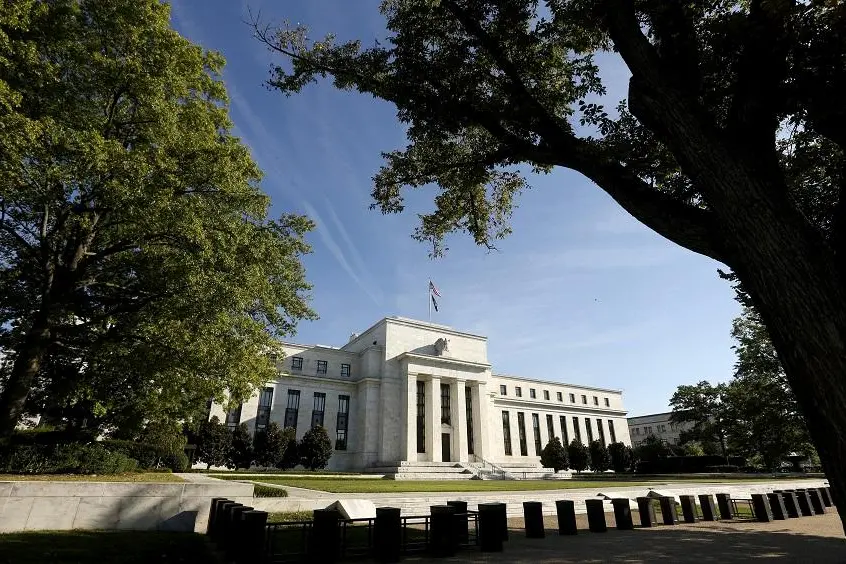PHOTO
- Asian shares drop, tracking a retreat on Wall Street
- Middle East markets mostly add gains on Wednesday
- Oil prices surge on tightening supply
- Dollar firms, gold prices add gains
As widely expected, the United States Federal Reserve raised interest rates on Wednesday. The U.S. central bank still foresees another rate hike in December, three more next year, and one increase in 2020.
Global markets
Asian shares dropped in early trading on Thursday, tracking a retreat on Wall Street overnight following the Fed’s rate hike.
MSCI’s broadest index of Asia-Pacific shares outside Japan dipped 0.05 percent in early trade while Japan’s Nikkei fell 0.45 percent.
On Wall Street, the Dow Jones Industrial Average fell 0.4 percent and the S&P 500 lost 0.33 percent. The Nasdaq Composite dropped 0.21 percent.
“The Fed seems to have grown more convinced of the need to keep raising rates beyond the neutral levels. I cannot see reasons to slow down raising rates as long as the jobless rate keeps falling,” Tomoaki Shishido, fixed income strategist at Nomura Securities, told Reuters.
“Three hikes next year is absurd,” Bob Baur, chief global economist at Principal Global Investors in Des Moines, Iowa, told Reuters.
“With an additional rate hike likely in 2018 and one in March next year, we will reach what many Fed governors feel is a neutral rate level. With the low odds of a spike in inflation, it makes sense that the Fed would pause after the March rate hike and allow the markets to adjust to its new policy,” he said.
Middle East markets
Most stock markets in the Middle East dropped on Wednesday, Saudi Arabia’s index retreated on profit-taking.
The Saudi index closed above its 200-day average on Tuesday, and investors booked profits on Wednesday, with the index closing 0.2 percent lower.
Saudi Basic Industries Corp (SABIC) slipped 1.4 percent, while Saudi Arabian Mining Co (Ma'aden) and Savola Group both fell 2.1 percent.
Dubai’s index added 0.8 percent as Emirates NBD surged 1.7 percent, Dubai Islamic Bank gained 1.0 percent. Emaar Properties added 0.8 percent.
Abu Dhabi’s index added 0.8 percent, as banks were among the main movers. First Abu Dhabi Bank climbed by 1.3 percent and Abu Dhabi Commercial Bank gained 1.0 percent.
Egypt’s main index added 1.8 percent as Commercial International Bank gained 1.9 percent, taking its climb in the last three days to 2.9 percent. Tobacco manufacturing company Eastern Company added 4.5 percent.
Qatar’s index gained 0.2 percent, Kuwait’s index rose 0.06 percent while Bahrain’s index dropped 0.4 percent and Oman’s index rose 0.4 percent.
Oil prices
Oil prices surged in early trading on Thursday, as market participants took into considerations the U.S. sanctions on Iran that will start from November 4.
Front-month Brent crude futures were at $82.17 per barrel at 0133 GMT, up by 83 cents, or 1 percent from their last close, just off Tuesday’s four-year highs.
U.S. West Texas Intermediate (WTI) crude futures were at $72.41 a barrel, up 84 cents, or 1.2 percent from their last settlement.
“We view that crude market risks are heavily skewed to the upside and whilst we are not explicitly forecasting Brent to rise to $100 per barrel, we see material risks of this coming to fruition,” Japanese bank Mitsubishi UFJ Financial Group said in a note to clients, according to a Reuters report.
“Oil prices remain in the Bulls domain amid concern that U.S. sanctions on Iranian crude oil exports will result in much tighter physical market conditions once they take effect in November,” Stephen Innes, head of trading for Asia/Pacific at futures brokerage OANDA in Singapore, told Reuters.
“Markets could still be underestimating the supply crunch from Iran sanctions,” he added.
Currencies
The dollar stood firm after the Fed’s decision to increase rates.
The dollar index against a basket of six major currencies stood at 94.266, having gained 0.13 percent on Wednesday.
Precious metals
Gold prices edged up after drops in the previous sessions.
Spot gold had risen 0.2 percent to $1,196.21 an ounce as of 0057 GMT. On Wednesday, the metal touched its lowest since Sept. 11 at $1,190.13 an ounce.
U.S. gold futures were up 0.1 percent at $1,200.40 an ounce.
(Writing by Gerard Aoun; Editing by Mily Chakrabarty)
(gerard.aoun@thomsonreuters.com)
Gain a deeper understanding of financial markets through Thomson Reuters Eikon.
Our Standards: The Thomson Reuters Trust Principles
Disclaimer: This article is provided for informational purposes only. The content does not provide tax, legal or investment advice or opinion regarding the suitability, value or profitability of any particular security, portfolio or investment strategy. Read our full disclaimer policy here.
© ZAWYA 2018





















